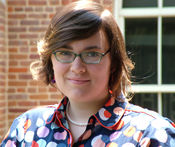Before Stephanie graduated, we asked her a few questions about herself.
Where did you go to high school?
I attended John Carroll Catholic High School in Birmingham Alabama.
How did you find out about the academic study of religion?
I suppose that, academically, religion has always been a part of my life. I attended parochial schools of varying denominations (Baptist, Episcopalian, and Catholic) for my primary and secondary education, so the influence of religion in my life has been profound (in a less conventional, less organized manner). Upon entering UA it just seemed natural to continue the study of religion, particularly the study of its impact on society, or, as a certain Department Chair might say, the study of religion in culture. However, despite my own inclinations toward religion, I doubt I would have discovered the wonders of UA’s Department of Religious Studies had it not been for Dr. Tim Murphy. Dr. Murphy taught my first Blount class and encouraged me to take his course on Native American religion the following semester–it was love at first sight, and that, my friends, is history.
What is your other major?
My other major is in Biological Sciences; I also have a minor in Liberal Arts through the Blount Undergraduate Initiative.
Why did you decide to double major?
I declared Biology as my major when I first entered UA as a freshman because I’ve always had an interest in science, and particularly in the medical field. I had thought of double majoring, but as a freshman I was wary of getting in over my head. However, after I took my first Religious Studies course I couldn’t seem to stop. I continued taking classes per Dr. Murphy’s suggestion and soon realized that with a few more hours I could major in Religious Studies–so, long story short, I did. Double majoring also appealed to me as a way of exploring both my scientific and humanist interests. I love science, and I have been involved in research through the Biology Department since my freshman year, but I also find myself constantly fascinated by human behavior and interactions–an interest that lends itself quite nicely to Religious Studies. Therefore double majoring seemed like the best way to appease the purportedly contradictory psychological dichotomy that occupies my thoughts.
You are doing some really interesting research in the Biology Department; can you tell us about it?
Certainly! I am currently a second year intern in the Howard Hughes Medical Institute’s program for undergraduate research and I am working in the “Phycolab” with Dr. Juan Lopez-Bautista, studying the systematics and phylogeny of marine red algae. I am especially interested in understanding the molecular relationships that exist among various samples of the “cosmopolitan” algae, Digenea simplex. In my research I am extracting and sequencing DNA from samples of Digenea simplex that have been collected from multiple locations world-wide, and I am using these DNA sequences to determine the range of molecular divergence that exists among the algal samples. By determining the range of molecular divergence between samples I will be better able to discern whether or not this algae is truly a species with a world-wide distribution, or if instead it is restricted to one specific geographical location. The molecular make-up of this alga is of particular importance medically because recent research that has been published in the past few years has suggested that extractions of Digenea simplex may be implicated in the treatment of HIV.
You have recently received some special honors, what are they?
In the past year I have had the honor of being named a Silverstein Fellow in the Department of Religious Studies, and I have also been awarded the Randall Award for Outstanding Undergraduate Research–an award that recognizes and encourages exemplary undergraduate research at the University. Most recently I’ve been selected as a fellow in the Blackburn Institute, an organization on campus that investigates concerns, and develops actions that will improve the quality of life for the state of Alabama and the nation.
What are your future plans?
I am currently applying to medical school where I hope to continue to pursue my humanist and scientific interests while gaining a greater knowledge of how these two realms of understanding may influence and impact each other on a physiological level. Using the knowledge I have gained from these academic pursuits I hope to be accepted into medical school where I will aspire to be a pediatric endocrinologist.

Degree: Biology/Religious Studies